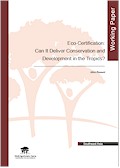| Working Paper Series |
 |
|
| Title | Eco-Certification: Can It Deliver Conservation and Development in the Tropics? | | Author | Mica Bennett | | Year | 2008 | | Publisher | World Agroforestry Centre - ICRAF, SEA Regional Office | | City of Publication | Bogor, Indonesia | | Series Number | Working Paper nr 65 | | Number of Pages | 64 | | Call Number | WP0103-08 | | Keywords | Eco-Certification, Indonesia, Rubber, Tropics, Conservation, Development, Payments for
Environmental Services |
|
| Abstract: |
| This paper investigates the potential for eco-certification to improve livelihoods and conserve biodiversity in tropical countries, using the example of a traditional rubber agroforestry practice in Indonesia. Eco-certification has the potential to allow farmers to generate revenue streams by marketing environmental benefits of their practices. However, in the years since eco-certification first began in 1993 to 2005 fewer than 1.5 percent of tropical forests had become eco-certified, compared to slightly over 31 percent of temperate forests. Nonetheless, eco-certification has promise for delivering conservation and development to the tropics, but it comes with much fine print to observe if it is to do so. This paper makes recommendation regarding the fine print including changes to current eco-certification practices that could make it a more effective option for the tropics.
Findings
• Eco-certification cannot deliver sustainable conservation if it does not also deliver
sustainable development. Failure of price premiums to materialize for eco-certified wood has strongly contributed to the low rates of eco-certification in the tropics.
• Choice of certification schemes should match local circumstances. Among the various
certification types (for example, organic and fair-trade) eco-certification offers the
strongest conservation protections, making it highly suited for situations with threatened biodiversity. Crops already traded internationally make the best choice for internationallybased eco-certification.
• Ways need to be found to reduce transaction costs and maximize conservation outcomes. The use of contracts that separate biodiversity from raw material value chains is a potential solution.
• The eco-certification space needs a “boundary spanning” to organization to forge a
learning system for transferring know-how to action. This learning system must engage
currently missing research expertise in business analysis and marketing to tackle issues
coming from the fiercely competitive retail of markets within developed countries.
• Eco-certification is new with a still evolving market. Its success or failure to conserve
environmental services depends on being able to motivate consumers to pay for the
certified environmental services so that producers can earn decent returns for providing global value. |
|
|
Download file(s): Click icon to download/open file.
|
| |
File Size |
Description |

|
697 KB |
Softcopy |
|
|
GRP 2: Maximizing on-farm productivity of trees and agroforestry systems
|
| Viewed in 2008 times. Downloaded in 680 times. |